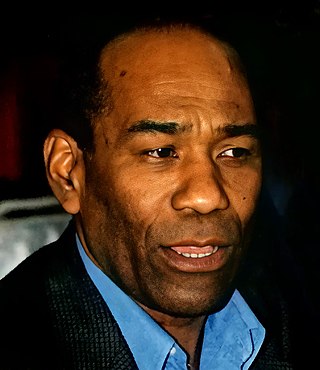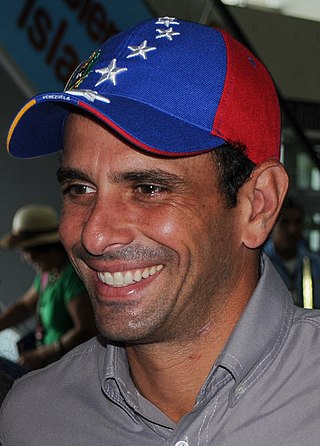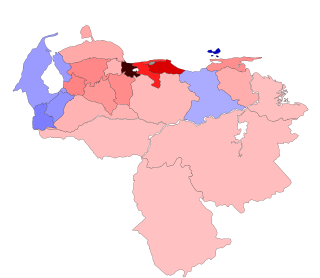Related Research Articles

The Cabinet of Ministers of Venezuela (Spanish: Gabinete de Ministros de Venezuela is one of the bodies that make up the Venezuelan executive in that country's presidential system, alongside the Council of Ministers. The Cabinet is headed by the president of Venezuela, and his corresponding vice president. The purpose of the ministries is to create, adopt, follow and evaluate policies, strategies, programs and projects in accordance with the constitution and the laws of the republic.

The Libertador Bolivarian Municipality is the only administrative division of the Capital District of Venezuela and along with the municipalities of Baruta, Chacao, El Hatillo and Sucre forms the Metropolitan District of Caracas. It is landlocked by Vargas State and also borders Miranda State on the east and south. The municipality is one of a number in Venezuela named "Libertador Municipality", in honour of Venezuelan independence hero Simón Bolívar.

Aristóbulo Istúriz Almeida was a Venezuelan politician and academic. He was vice president of the Constituent Assembly of Venezuela as well as vice president of Venezuela.

Henrique Capriles Radonski is a Venezuelan politician and lawyer, who served as the 36th Governor of Miranda from 2008 to 2017.

Regional elections were held in Venezuela on 23 November 2008 to choose 22 governors and 2 metropolitan mayors. The candidates were selected for a term beginning in 2008 and ending in 2012, when the next regional elections will be held. The 2008 regional elections were the second during the government of Hugo Chávez Frías and the first since he founded the United Socialist Party.

Antonio José Ledezma Díaz is a Venezuelan lawyer, opposition politician and former political prisoner. After unsuccessfully challenging for the leadership of Democratic Action in 1999, he founded a new party, the Fearless People's Alliance.

The 2014 Venezuelan protests began in February 2014 when hundreds of thousands of Venezuelans protested due to high levels of criminal violence, inflation, and chronic scarcity of basic goods because of policies created the Venezuelan government. The protests have lasted for several months and events are listed below according to the month they had happened.
The following lists events that happened during 2014 in Venezuela.
The following lists events that happened during 2015 in Venezuela.

Regional elections were held in Venezuela on 15 October 2017 to elect the executive position of all 23 federal entities. This marked the first state executive election not held on the same date as elections for state legislatures, and the second separate from municipal elections. They were the 9th regional elections held in Venezuela since 1989.

The 2017 Venezuelan protests began in late January following the abandonment of Vatican-backed dialogue between the Bolivarian government and the opposition. The series of protests originally began in February 2014 when hundreds of thousands of Venezuelans protested due to high levels of criminal violence, inflation, and chronic scarcity of basic goods because of policies created by the Venezuelan government though the size of protests had decreased since 2014. Following the 2017 Venezuelan constitutional crisis, protests began to increase greatly throughout Venezuela.

The Mother of All Marches, also known as the Mother of All Protests, was a day of protests held on April 19, 2017, in Venezuela against the Chavista government of president Nicolás Maduro. The protests began after the Supreme Tribunal of Justice dissolved the National Assembly and took over its legislative powers March 29, 2017 in what was called a self-coup. The dissolution of the National Assembly was reversed shortly thereafter on April 1, 2017.

Freddy Guevara is a Venezuelan politician. He was elected deputy to the Venezuelan National Assembly for Circuit 2 of the Miranda State representing the Democratic Unity Roundtable in the parliamentary elections of December 6, 2015. He has been a key figure of the opposition to Nicolás Maduro, Guevara was arrested in July 2021 charged with crimes against the state. The United States and others condemned the arrest as politically-motivated. In mid-August, he was freed as part of negotiations between the Maduro government and the Venezuelan opposition.

Juan Gerardo Guaidó Márquez is a Venezuelan opposition politician. He belonged to the social-democratic party Popular Will, and was a federal deputy to the National Assembly representing the state of Vargas. On 23 January 2019, Guaidó and the National Assembly declared that he was acting president of Venezuela, starting the Venezuelan presidential crisis by challenging Nicolás Maduro's presidency. In December 2022, opposition parties voted to dismiss Guaidó as interim president, choosing Dinorah Figuera as a successor on 5 January 2023 and ending Guaidó's presidential claim.
The negotiations during the crisis in Venezuela are the negotiation and dialogue attempts and processes between the government of Nicolás Maduro and the Venezuelan opposition. Although numerous dialogue processes and roundtables have taken place, by 2023 none had been effective in achieving a solution to the country's crisis.

During the 2019 Venezuelan presidential crisis, AP News reported that "familiar geopolitical sides" had formed, with allies Russia, China, Iran, Turkey, Syria, and Cuba supporting Maduro, and the US, Canada, and most of Western Europe supporting Juan Guaidó as interim president. Amid widespread condemnation, President Maduro was sworn in on 10 January 2019, and the President of the National Assembly, Guaidó, was declared the interim President by that body on 23 January 2019. Intervention by the United States in Venezuela has been criticized by allies of Nicolás Maduro and political figures from the left spectrum; Maduro's government states that the crisis is a "coup d'état led by the United States to topple him and control the country's oil reserves." Guaidó denies the coup allegations, saying peaceful volunteers back his movement.

Presidential elections are scheduled to be held in Venezuela in 28 July 2024 to choose a president for a six-year term beginning on 10 January 2025. Leading opposition candidates have been disqualified from participating in the election during campaign or in previous elections. In June 2023, the leading candidate María Corina Machado was barred from participating by the Venezuelan government for alleged political crimes. This move has been regarded by the opposition as violation of political human rights and has been condemned by international bodies like the Organization of American States, the European Union, and Human Rights Watch, as well as countries such as Colombia, Paraguay, Uruguay, Ecuador, United States, United Kingdom, Germany, Chile, Canada, France and Mexico.

A preliminary examination by the International Criminal Court (ICC) to analyze possible crimes against humanity committed in Venezuela is currently open. A preliminary examination was previously opened in 2006, but closed after concluding that the requirements to start an investigation had not been met. In February 2018, the ICC announced that it would open preliminary probes into alleged crimes against humanity performed by Venezuelan authorities since at least April 2017. In 2020, the Office of the Prosecutor of the ICC stated that it believed there was a "reasonable basis" to believe that "since at least April 2017, civilian authorities, members of the armed forces and pro-government individuals have committed the crimes against humanity", and on 2021 ICC Prosecutor Karim Khan announced the opening of an investigation regarding the situation in the country.
Eduardo Piñate is a Venezuelan teacher, historian and politician. He was appointed Minister of Education (MPPE) and sector vice president for the Social and Territorial Socialism of Venezuela. He was appointed into office on May 2, 2021 by President Nicolas Maduro. He has held other positions as Minister of People's Power for the Social Process of Work and elected as a Deputy of the National Assembly of Venezuela in the 2010 parliamentary elections.
Oneida Del Valle Guaipe de Ávila is a Venezuelan politician, currently an alternate deputy of the National Assembly for the Anzoátegui state. Before being elected as deputy, Oneida served as a union leader of public employees in the health sector in the state.
References
- ↑ Dorante, Carlos López (2021-06-29). "CLAVES | ¿Qué son los protectorados y por qué existen en Venezuela?". El Pitazo . Retrieved 2021-11-21.
- ↑ "Venezuela: alcalde levanta huelga de hambre tras llegar acuerdos con la OEA". InfoLatAm. 2009-07-08. Archived from the original on 2009-07-14. Retrieved 2021-09-02.
- ↑ "Ledezma levanta huelga de hambre". NoticieroDigital. 2009-07-08. Archived from the original on 2009-07-10. Retrieved 2021-09-02.
- 1 2 3 "Jefe junta electoral saluda que Maduro elimine a los "protectores" regionales". Swissinfo . EFE. 2021-06-29. Retrieved 2021-09-02.
- ↑ "Designaron a Aristóbulo Istúriz como "protector" de Anzoátegui". Runrun.es. 17 June 2020. Retrieved 10 August 2021.
- ↑ "El diputado Luis José Marcano sustituye a Aristóbulo como Protector del estado Anzoátegui". Diario El Vistazo. 2020-12-30. Retrieved 2021-11-21.
- ↑ "Estos son los candidatos a la Gobernación de Mérida". Caraota Digital. 2021-11-18. Retrieved 2021-11-21.
- ↑ Rosas, Roselis González. "Nueva Esparta: la oposición contra la oposición". Cinco8 (in Spanish). Retrieved 2021-11-21.
- ↑ Nacional, El (31 January 2018). "Freddy Bernal fue designado como "protector" del Táchira".